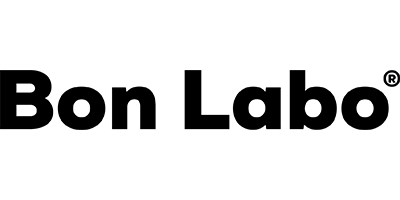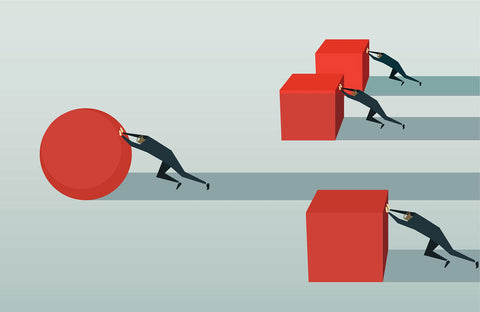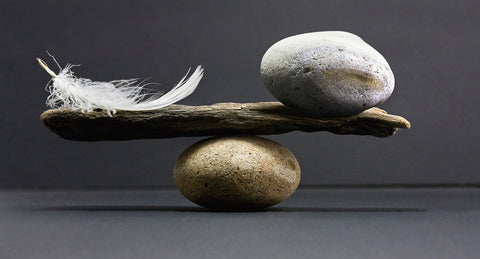Welcome to an article that is not only suitable for the CEO, but also for all of us who want to work smarter and improve our quality of life. We've delved into scientific research to bring you evidence-based recommendations that can transform the way you work.
Optimize your working life: Science's path to higher productivity and a better quality of life
In today's fast-paced society, hard work is often considered the only path to success. But this notion is being challenged by new research that suggests the key to achieving more may actually be working less—or at least smarter . To help you transform your work performance and quality of life, we explore here how scientific insights can be applied to practical strategies.
Walk and Talk meetings
In a busy work day, the idea of making meetings while walking can be a game changer. Stanford University research emphasizes that walking can significantly increase creative thinking. This is due to the increased blood flow and oxygen supply to the brain that occurs during physical activity.
In addition, walk and talk meetings promote physical health and mental clarity. It is not only good for the body, but also for the mind. These types of meetings can also help reduce stress and improve mood, which are essential for productive and positive working relationships.
So the next time you have a meeting, consider taking it on the go. It may be the step needed to break out of the traditional meeting routine and open up to fresh, innovative ideas.
Work less - achieve more
The modern workplace is often designed around expectations of long working days and constant availability. Dr. Alex Pang , author of Rest: Why You Get More Done When You Work Less , argues that this approach is not only ineffective, but also harmful to our creativity and long-term sustainability at work. He argues that time for rest and recovery is fundamental to achieving high productivity and should be considered as important as the work itself.
Understand deep work
In Deep Work: Rules for Focused Success in a Distracted World, Cal Newport highlights the importance of immersing yourself in tasks that require intense concentration. Newport explains that in a world full of distractions, the ability to engage in deep work is more valuable than ever. Developing this ability requires structure, discipline, and a conscious effort to minimize interruptions so you can immerse yourself in work that creates real value.
Scientific insight into working time
Scientific studies have shown that there is a limit to how much effective work we can do in a day. A breakthrough research project published in The Lancet has shown that productivity drops significantly when the working week exceeds 55 hours. These findings suggest that working long hours is not necessarily the most productive strategy and emphasize the importance of finding a balance between work and leisure.
Strategies for a balanced workflow
Based on insights from The Power of Full Engagement by Tony Schwartz and Jim Loehr , it is suggested that workdays should contain a rhythm of work and rest, rather than being a marathon without breaks. Schwartz and Loehr liken productive workflows to training regimens for athletes, where high-intensity performance is balanced with adequate rest and recovery.
The role of technology
While technology can be a distraction, it can also be a powerful ally in our efforts to be more productive. Using tools and apps to organize work, maintain focus and block out distractions can be critical to creating space for deep work. Articles from Psychology Today emphasize how strategic use of technology can support our concentration and productivity.
Counter the myth of hard work
A publication in the Journal of Occupational Health Psychology demonstrates that persistent overtime can have serious health consequences and a decline in creative thinking. The Harvard Business Review backs this up by suggesting an approach that includes purposeful time management and task prioritization that can improve productivity without sacrificing job satisfaction.
Find the perfect break
How to structure your workday for optimal performance and well-being can vary from person to person. Methods like the Pomodoro technique , which uses 25-minute intervals of focused work followed by short breaks, can be a good starting point, but it's important to adapt and experiment to find what works best for individual needs and work style.
Our evidence-based recommendations
- Find your rhythm: Experiment with different work and break lengths to discover which pattern increases your productivity.
- Prioritize deep work: Block time in your calendar for tasks that require intense concentration and eliminate possible interruptions.
- Schedule breaks: Strategic breaks can refresh your mind and improve your performance throughout the day.
- Use technology wisely: Choose apps and tools that enhance your ability to stay focused and organized.
- Be health conscious: Working overtime can harm your health and ability to work in the long term, so be aware of signs of overload.
-
Supplement your productivity with evidence-based supplements: For those looking for extra support to improve performance, strengthen against stress and achieve balance in everyday life, supplements like Tiger can be ideal. This supplement is designed for a busy lifestyle and to promote performance, cognitive performance, strengthen the body against stress - so we keep the overview. This grant contains, among other things, powerful adaptogens - here's what Forbes has to say about these herbs:
" Adaptogens can promote health, stabilize mood and improve performance and focus."
By applying the above science-based strategies, you can improve your work efficiency and quality of life. Remember, it's not about working harder, but smarter. Even the most dedicated among us need time to recharge and reflect. Finding balance in everyday life is the key to not only performing at our best, but also to creating a life we love and value.



